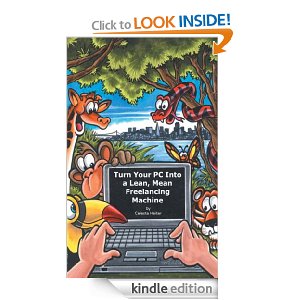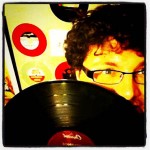By Celeste Heiter
Throughout my life, it seems, I’ve had to wait for technology to catch up with my dreams. As a child, I grew up in family that valued both academic achievement and creative expression, and in high school, I excelled in the clerical arts. So, as a young woman, I graduated from college with a bachelor’s degree in both English and Art.
I loved ad layout and graphic design, but had little patience for the technical precision it required. In those days, graphic artists were still using Letraset dry transfer font sheets to set type, and wax-adhered paste-ups for publication layout. And although my veins practically course with printer’s ink, and I had always dabbled in creative writing, I hadn’t a clue how to break into the world of publishing…Unless I count my first real job, working as a classified ad typist at our local newspaper, a short-lived summer job that never segued into the editorial department.
Upon graduating college, with zero prospects in journalism or graphic design, I earned my daily bread waiting tables and tending bar. I was good at both, and although I loved the culinary world (and still do), I never gave up on the notion of someday working in the publishing industry.
Fast-forward twelve years, to the day I got my first computer. By then, I was the mother of a precocious toddler, and my first attempts at publishing were two parenting books: one called Potty Pals, a children’s book for potty training; and another one for parents titled The Reading Seed, outlining how I taught my son to read at age two. But even with the advent of the home PC for “desktop publishing” (as it was called back then), neither of my books took flight. So I shelved them both and went back to the restaurant business.
Fast-forward another nine years, to the day I submitted my first story to a publisher of web-based travel articles. Not only did he publish the story I submitted, he assigned me to write four more articles, which eventually became the foundation for my first published book, Ganbatte Means Go for It…Or How to Become an English Teacher in Japan.
There was no stopping me now. I had finally cracked the publishing nut, and I wanted more. So the first thing I did was streamline my computer (now a laptop model) for optimal productivity. I set up my Internet browser to maximize my research time, customized all my publishing and bookkeeping software, and organized my documents for easy access. In less than a year, I had transformed myself and my laptop into a lean, mean, freelancing machine, and had written an e-book to show other freelance writers how I did it.
 The next thing I did was quit my day job, and…I’ve never looked back. Ten years and six laptops later, my gaze is firmly fixed on the future of publishing: E-Books! In the past few months, with the help of that precocious toddler who has since grown into a brilliant young man with a degree in computer science, I’ve been hard at work learning to design and code e-books for Amazon Kindle. I’m now offering my e-book design services to independent authors, and have more than a dozen of my own titles in circulation, including Turn Your PC Into a Lean Mean Freelancing Machine.
The next thing I did was quit my day job, and…I’ve never looked back. Ten years and six laptops later, my gaze is firmly fixed on the future of publishing: E-Books! In the past few months, with the help of that precocious toddler who has since grown into a brilliant young man with a degree in computer science, I’ve been hard at work learning to design and code e-books for Amazon Kindle. I’m now offering my e-book design services to independent authors, and have more than a dozen of my own titles in circulation, including Turn Your PC Into a Lean Mean Freelancing Machine.
With machete as metaphor in the jungle of the publishing industry, this lively and colorful e-book (for which I also designed the layout) teaches aspiring writers to streamline their computers for productivity, and shows how to maximize the potential for publishing success. Each page is packed with my best tips and secrets as a successful freelance writer and published author: from customizing software and setting up time-saving shortcuts, to finding sources for freelance writing jobs. And of course…Freelance Zone is mentioned on my short list of the best resources for freelance writers!
About the Author: With her lifelong love of Japan, its people, and its culture, Celeste Heiter believes that she may have been Japanese in a previous incarnation. In this lifetime however, Celeste was born in Mobile, Alabama, where she earned a Bachelor’s degree in Art and English from the University of South Alabama.
Inspired by a lifelong dream to visit the Great Buddha at Kamakura, she moved to Tokyo in 1988, where she spent two years teaching English conversation. Celeste now makes her home in California’s beautiful Napa Valley, with the most treasured souvenir of her life in Japan: her son Will, who was born during her stay in Tokyo. Her books are inspired by her travels, and by her culinary creativity as a cookbook author, food writer, and photographer.

Celeste is the author of Turn Your PC into a Lean Mean Freelancing Machine, the creator of the LoveBites cookbook series for Kindle Fire, and the author of Potty Pals , a potty-training book for children (PottyPalsBook.com). She has also written ten books published by ThingsAsian Press (ThingsAsianPress.com); and spent eight years posting her recipes, food photographs, and film reviews on ChopstickCinema.com.
Visit her website at CelesteHeiter.com, and her Amazon Author Page at http://www.amazon.com/Celeste-Heiter/e/B002OXU6S2



